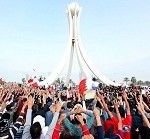On February 11, two years ago, Hosni Mubarak stepped down from his position as Egypt’s long-time President, after protests from his young population rocked the country. It seemed as if the revolution was complete, and that life would begin anew, afresh, and awakened, after decades of discontent.
Belying the euphoria and expectations of early transition, however, the momentous political upheavals in the Arab world which started in the spring of 2011 show no sign of closure. Over two years after that remarkable outpouring of public anger in the streets of Tunis, Cairo, Tripoli, Manama, Rabat, Amman and Damascus, the Arab uprisings have become amorphous: neither are their goals determinate, nor the course irreversible, nor the pace of transition even.
This was expected from such a complex region. It was cowed down by the jack-boot of authoritarianism sheltering under the intractable, yet evocative, goal of an independent Palestine state, and its corollary – the struggle against Israel. The situation was further complicated by the recrudescence of sectarianism unleashed by the U.S. invasion of Iraq in 2003, and the resurgence of a well-organised, ostracised Muslim Brotherhood.
Visible now is a patchy transition towards democracy in some countries like Egypt, Tunisia and Yemen, heavily weighted in favour of Islamic-inspired governance. In others, like Bahrain and Syria, ‘counter-revolution’ by the entrenched structures has held popular will at bay. The broad goal of protesters to usher in governance which is both participative and inclusive is far from becoming a reality.
The depth and complexity of these upheavals mostly caught India unawares. As a result, its stances have appeared reactive, vacillating, transactional, and primarily focused on the domestically-driven imperative to provide assistance and logistic support to Indian nationals beleaguered in the political storm. Although New Delhi was initially hesitant in accepting the popular protests against erstwhile leaders with whom it maintained good relations, as the world’s largest democracy, India had no alternative but to welcome the transitions to democracy. India has preferred to keep a low profile so the sectarian contagion does not affect its own Muslim community. It has taken a pragmatic approach in the hope of keeping intact its core interests: the security and safety of its expatriates, investments and projects in the region, crude oil and gas supplies, flow of remittances, and the linkages of its Muslim community.
India’s two-year tenure in the United Nations Security Council, coinciding with the Arab Spring, forced New Delhi to articulate its positions on the emerging situations, which became the bell-weather of the Western intentions in the Arab uprisings – Libya, Bahrain and Syria. All three demonstrated that despite professions in favour of democracy, the West responds to the Arab uprising only in line with its strategic and geopolitical interests. While NATO airstrikes were approved in Libya, there was no move to take up Bahrain’s case in the Council, in deference to the wishes of Saudi Arabia and mindful of the U.S.’s 5th fleet based in Bahrain. In Syria’s case, given the strong opposition by Russia and China, there is a deliberate move not to seek a national dialogue and curb internecine violence until President Bashar al-Assad has been removed.
India was seen wanting in all three cases not only within the country but in the region as well. Its abstention on the Libya resolution and its vacillating stand on resolutions on Syria did not demonstrate a well-calibrated policy – it also opened the government to charges of succumbing to U.S. and Saudi pressure.
While its current strategy has immunised New Delhi from the political and religious dimensions of the uprisings, the rise of political Islam, Islamic governance, and continuing instability will impact India. New Delhi’s view of the Arab uprisings has also evolved on a case-by-case basis, depending on the nature of its core interests, especially with regard to the Gulf countries. India has the maximum degree of linkages with the Gulf through crude oil supplies, jobs for Indian nationals, remittances, trade and cross-investments in manufacturing, financial and IT services. India’s presence in the beleaguered countries in West Asia and North Africa largely rests on investments in oil and gas, petroleum and petro-chemical projects; protecting them by building contacts with the new political and economic centres of power remains a major priority.
In coping with the on-going Arab uprisings, India will have to tread a fine line between four major imperatives: immunising itself from the sectarian divide in the region led by Saudi Arabia and Iran; keeping to a policy line based on its own core interests while avoiding charges of susceptibility to Western pressure, as in the case of Iran sanctions; ensuring its strong support to the Palestinian cause remains intact; and warding off negativity vis-à-vis its prolific relations with Israel, given the growing Islamisation of new dispensations.
It is time for India to take proactive steps to build relations with new governments taking office in Egypt, Tunisia, Yemen, Morocco and Jordan, and buttress its existing relations with Iraq, Iran and Turkey. The immediate convening of bilateral forums like Foreign Office Consultations and Joint Commissions would provide an excellent opportunity to understand the changes taking place in those countries. This will require a heightened focus on political-level visits, trade and industry initiatives, cultural, educational, and civil society exchanges to promote people-to-people relations and the Indian model of secular and participative democracy as worthy of emulation.
Ambassador Rajendra Abhyankar, a former Indian diplomat with accreditation to Syria, is Chairman, Kunzru Centre for Defence Studies and Research, Pune. He is also co-author of a research paper on West Asia and North Africa, which will be released in February 2013.
This article was exclusively written for Gateway House: Indian Council on Global Relations. You can read more exclusive content here.
For interview requests with the author, or for permission to republish, please contact outreach@gatewayhouse.in.
© Copyright 2013 Gateway House: Indian Council on Global Relations. All rights reserved. Any unauthorized copying or reproduction is strictly prohibited.


